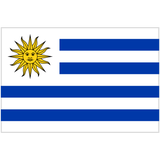
Tabarez: The school teacher who educated Uruguay
MONTEVIDEO, Uruguay (AP) Oscar Tabarez was brought in from the cold to coach Uruguay in 2006 and revive a team which hadn't really fired since his first stint ended in the round of 16 of the 1990 World Cup.
He revived Uruguay, and continues to.
On his second watch as coach, Uruguay has qualified for a third straight World Cup.
In 2010, he led Uruguay to fourth in South Africa. In 2014, the Celeste beat Italy and England in the pool stage only to fall to Colombia in the round of 16. This time, it's in the same pool as host Russia, Saudi Arabia and Egypt.
''Tabarez made the great change that Uruguay needed,'' Uruguay Football Association head Wilmar Valdez said in a room of trophies obtained in the old glory days of the two-time World Cup champion.
But Tabarez was expected to resign in 2016 after he was diagnosed with Guillain-Barre syndrome, a neurological disease. Tabarez faced difficulties moving, requiring a walker and an electric wheelchair. He did not go home, though. Instead, he told his bosses there was nothing keeping him from working.
''I am not living with any pain. This neuropathy sometimes causes me problems, especially to walk. But since this is a chronic illness, sometimes I am a little better,'' Tabarez said.
His health seems somewhat better in the runup to the World Cup in Russia.
Nicknamed ''El Maestro'' (The Teacher) because he worked at schools in his early days, Tabarez brought better discipline to Uruguay teams which were plagued by red cards.
Captain and defender Diego Godin said Uruguay's coaching staff still give long lectures to players even when they are sent off playing for their clubs.
''Today, 11 of us come in and 11 come out!,'' Tabarez tells his players, according to an account by striker Diego Forlan in a book on the coach's legacy.
Goalkeeper Fernando Muslera told The Associated Press: ''What the Teacher achieved in this time is very big because he started totally from scratch. He has created everything we achieved and what is yet to come. If Uruguay is this respected worldwide it is because he made it.''
Tabarez extends his influence to Uruguay's youth divisions. He not only achieved good results there, but also brought players to the senior team thanks to better coordination with youth coaches.
One of those youngsters is midfielder Nahitan Nandez, who talked to Tabarez for the first time at a Uruguay Under-20 team practice.
''Each ball I was given made me want to keep it for 20 meters ahead,'' Nandez said. ''The Teacher said I should not do that, that I should play for the team.''
The few detractors of the 71-year-old coach say he's been lucky to count on a generation of great talent, with the likes of Forlan, Luis Suarez, and Edinson Cavani.
''When Suarez and Cavani began they were not like this, same with Godin,'' Valdez says. ''He was the one who developed those players.''
Tabarez believes in effort, order and discipline, and that a country of 3.3 million people cannot waste energy if it aims to compete with the likes of Brazil and Argentina.
When Uruguay returned from South Africa in 2010, a big crowd welcomed the team home as if it had won the World Cup. When most supporters expected a triumphant speech, Tabarez gave them some philosophy: ''The path is the reward.''
His comments remain understated. All that he promises in Russia is that Uruguay will fight in every match.
